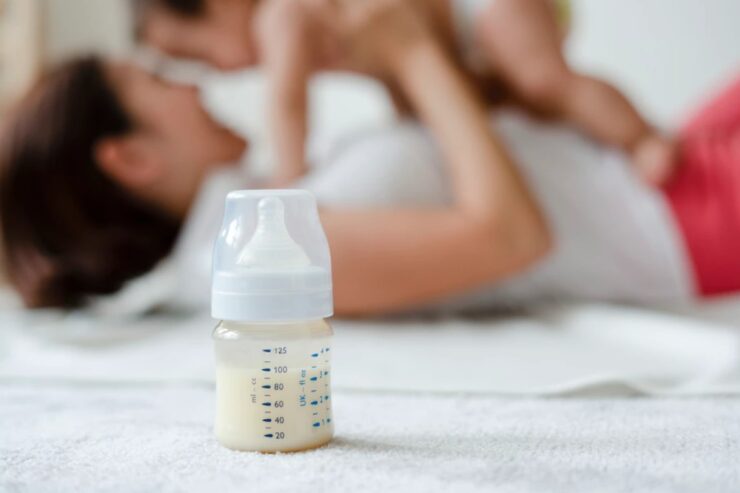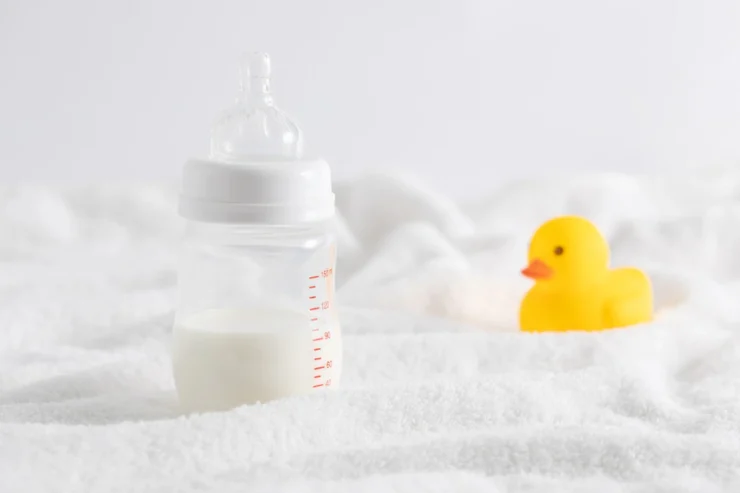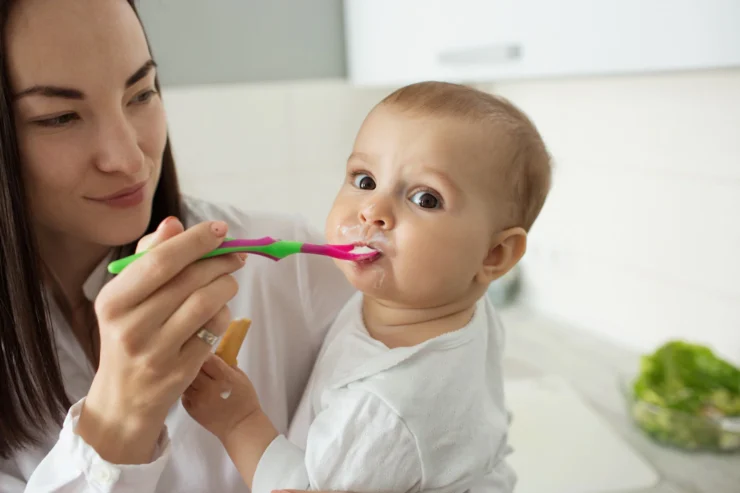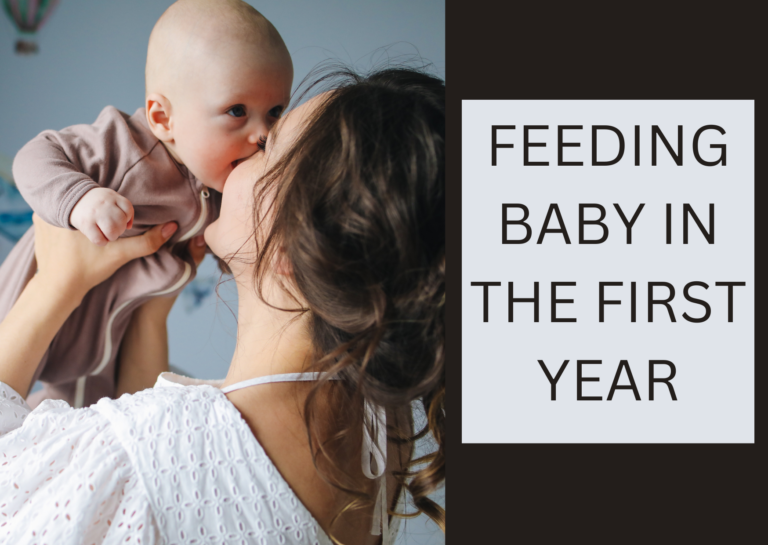Moms and dads feel overwhelmed during the first year of parenting. Babies don’t talk and cannot express their wishes directly, so parents have to learn their child’s behaviour to predict its needs.
Parents learn how to change diapers or dress their infants quickly, but feeding is always more problematic. When is a baby hungry or full? When is it necessary to buy a new baby formula? When is the best time for the first lure? Find all the answers here.
When Is It Time to Feed a Baby?

Newborns may need food more than eight times a day because they learn to eat. Lactation specialists teach mothers to hold a baby and give a nipple correctly to avoid health problems. If an infant eats baby formula, it will be necessary to choose a nipple with the appropriate hole to prevent choking.
Moreover, it is essential to follow the feeding chart recommendations and mix the formula with sterile boiled water in the correct proportions.
Three signs show that your baby is hungry.
1. It opens its mouth, looking for the source of food.
2. A baby licks its lips.
3. A baby sucks its fist.
If a baby sits independently, it can show its interest in food by taking various objects or food at its fingertips to its mouth. A mother should not introduce adult food to kids who cannot sit and hold their heads independently. Most pediatricians recommend starting the first lure when babies are six months old.
What Food Does a Baby Need Until 6 Months Old?

Parents have two options for feeding their babies – breastfeeding and formula feeding. The first option is the easiest and safest because a mother needs only to stay hydrated to have enough milk in her breasts. Except for breast milk, a baby requires vitamin D in drops because a baby might suffer severe insufficiency.
The second option is an excellent alternative to breastfeeding, though parents need to consult a health expert to select the right baby formula for their infant.
Pediatricians recommend using one of the top-three available options:
• vegan formula
• cow formula
• goat formula
The selection depends on a baby that can tolerate animal milk or have an allergy to it. Moreover, there are organic and non-organic baby foods, and this criterion is significant. Organic products are natural and lack harmful components that cause severe health problems. So, it is better to prefer natural food to help a baby stay healthy.
What Should Not Parents Give to Their Children Until They are Six Months Old

A baby should eat only safe food. Parents should not prepare formulas on their own because they might select the wrong products and proportions. Moreover, a bottle, a nipple, the cooking surface, and a spoon must be sterile to prevent germ and bacteria accumulation.
The feeding tools must be of high quality, and all ingredients must be fresh. It’s hard to guarantee these conditions day and night. Besides, all these preparations exhaust mothers, especially during night feedings.
Another thing to avoid is giving whole milk to a baby. Cow’s milk is created merely for calves, so parents should be careful when using it as the main food for infants. Parents often overdo it, and babies regurgitate quickly and suffer from indigestion. Consequently, they suffer from iron deficiency and may lack other essential nutrients.
Parents should not introduce adult food to a baby until it’s six months old and can independently sit and control its head and hands. A baby’s digestive system is not ready for solid food at that period, so it’s better to follow an expert’s recommendations to let a baby get prepared for new meals. A kid must show interest in adult food. Otherwise, babies will resist and accept meals as punishment.
What Should Kids Eat After 6 Months?
When a kid is six months old, it is high time to introduce adult food to the child. Even though baby formula or breast milk remains the leading food for a baby, solid food must start to replace it.
Step by step, spoon by spoon, parents should teach their children to adapt to new products, and allergic products are no exception.
What is the best food for 6-months-old babies?

• Animal derivatives (meat, eggs, dairy, and fish)
• Vegetables (the first food must not be allergic like carrots or pumpkin; avocado and zucchini fit best)
• Fruit (the first one must be something easy to digest, like bananas and baked apples)
• The greenery (lettuce, spinach, etc.)
• Berries and seeds (nuts, blueberries, raspberries, etc.)
• Grains (cereal, whole grain bread, rice)
Parents should also prepare food before introducing it to a baby. First, the first lure should be cooked, and baking, boiling, stewing, and steaming are the best cooking options. Secondly, the consistency of meals must be appropriate, and the prepared food must be mashed, diced, or pureed. Moreover, it must be soft to avoid choking.
Food Required for Kids from 9 to 12 Months Old
When kids are over nine months old, parents should reduce formula feeding frequency to a minimum. At this stage, adult food should replace breast milk and infant formula. Nevertheless, some kids require night meals. That’s why a mother should either breastfeed or select the best baby food variant. One can visit OrganicsBest to find a top-quality organic formula for 10+ kids.
For example, HiPP produces baby formula for kids over 12 months old. They are marked as Stage 2 (12+) and 3 (24+). It means that one serving contains all the required nutrients in the desired proportions. The older a baby becomes, the more nutrients it requires to stay healthy and avoid diseases.
Things Parents Should Not Do When Feeding a Baby

Some parents try to feed a baby a whole portion of food at once, but it’s necessary to start with a teaspoon and go on increasing portions daily. When a baby keeps its mouth closed and refuses to open it when a spoon touches its lips, it means it is not hungry anymore. Parents should not overfeed a baby because it hurts it. That’s why it is significant not to feed a baby using distractions (videos or cartoons) because it can lead to obesity and indigestion.
Another mistake is to give juice, tea, or milk instead of water. Water is the healthiest drink for all living beings because it does not contain calories, fats, and carbs but perfectly hydrolyzes the organism. So, kids can drink it as much as they need without harm to their health.
Finally, parents should introduce new adult food separately, which means one gives either a potato or a pumpkin at a time to see a kid’s reaction to the product.

